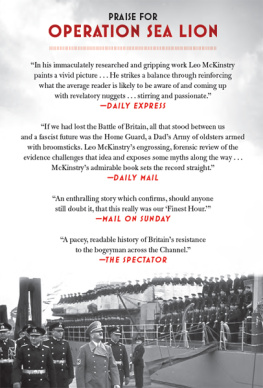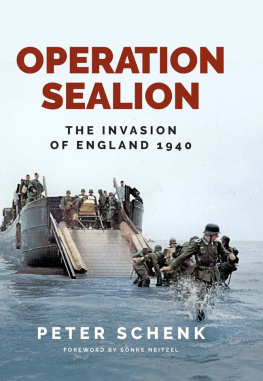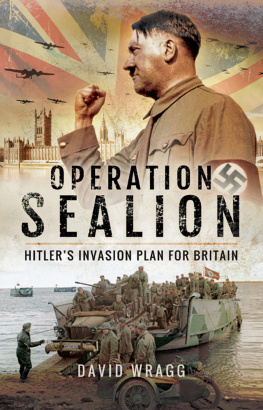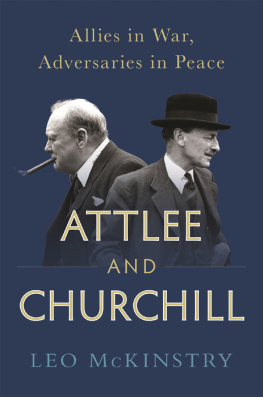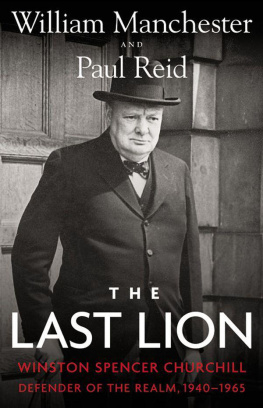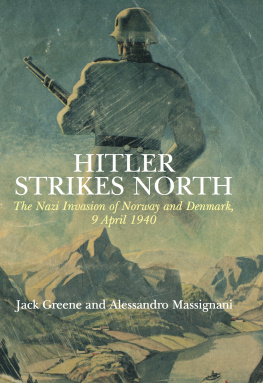McKinstry - Operation Sea Lion: the failed Nazi invasion that turned the tide of the war
Here you can read online McKinstry - Operation Sea Lion: the failed Nazi invasion that turned the tide of the war full text of the book (entire story) in english for free. Download pdf and epub, get meaning, cover and reviews about this ebook. City: New York;NY, year: 2014, publisher: The Overlook Press, genre: Non-fiction. Description of the work, (preface) as well as reviews are available. Best literature library LitArk.com created for fans of good reading and offers a wide selection of genres:
Romance novel
Science fiction
Adventure
Detective
Science
History
Home and family
Prose
Art
Politics
Computer
Non-fiction
Religion
Business
Children
Humor
Choose a favorite category and find really read worthwhile books. Enjoy immersion in the world of imagination, feel the emotions of the characters or learn something new for yourself, make an fascinating discovery.
- Book:Operation Sea Lion: the failed Nazi invasion that turned the tide of the war
- Author:
- Publisher:The Overlook Press
- Genre:
- Year:2014
- City:New York;NY
- Rating:4 / 5
- Favourites:Add to favourites
- Your mark:
- 80
- 1
- 2
- 3
- 4
- 5
Operation Sea Lion: the failed Nazi invasion that turned the tide of the war: summary, description and annotation
We offer to read an annotation, description, summary or preface (depends on what the author of the book "Operation Sea Lion: the failed Nazi invasion that turned the tide of the war" wrote himself). If you haven't found the necessary information about the book — write in the comments, we will try to find it.
McKinstry: author's other books
Who wrote Operation Sea Lion: the failed Nazi invasion that turned the tide of the war? Find out the surname, the name of the author of the book and a list of all author's works by series.
Operation Sea Lion: the failed Nazi invasion that turned the tide of the war — read online for free the complete book (whole text) full work
Below is the text of the book, divided by pages. System saving the place of the last page read, allows you to conveniently read the book "Operation Sea Lion: the failed Nazi invasion that turned the tide of the war" online for free, without having to search again every time where you left off. Put a bookmark, and you can go to the page where you finished reading at any time.
Font size:
Interval:
Bookmark:
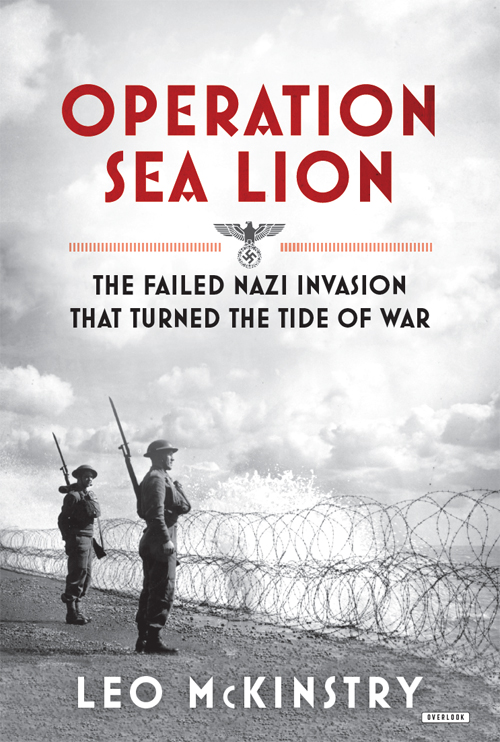
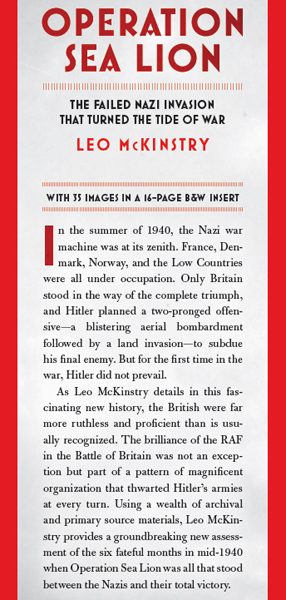
Fit to Govern? (1996)
Turning the Tide (1997)
Boycs: The True Story (2000)
Jack and Bobby: A Story of Brothers in Conflict (2002)
Rosebery: Statesman in Turmoil (2005)
Sir Alf: Englands Greatest Manager (2006)
Spitfire: Portrait of a Legend (2007)
Lancaster: The Second World Wars Greatest Bomber (2009)
Hurricane: Victor of the Battle of Britain (2010)
Jack Hobbs: Englands Greatest Cricketer (2011)
This edition first in published hardcover in the United States in 2014 by
The Overlook Press, Peter Mayer Publishers, Inc.
141 Wooster Street
New York, NY 10012
www.overlookpress.com
For bulk and special sales, please contact sales@overlookny.com,
or write us at the address above.
Copyright Leo McKinstry, 2014
First published in Great Britain in 2014
by John Murray (Publishers)
An Hachette UK Company
All rights reserved. No part of this publication may be reproduced or transmitted in any form or by any means, electronic or mechanical, including photocopy, recording, or any information storage and retrieval system now known or to be invented, without permission in writing from the publisher, except by a reviewer who wishes to quote brief passages in connection with a review written for inclusion in a magazine, newspaper, or broadcast.
ISBN 978-1-4683-1112-9
This book is dedicated to the fond memory of
Katharine Kinney (19592013)
adventurer and heroine

T HE ATMOSPHERE INSIDE the Berlin Sportpalast was electric that early September afternoon in 1940. The arena was packed to its 14,000 capacity. Amidst hysterical cheering, the Fhrer marched onto the stage, his impassive mien in graphic contrast to the frenzied enthusiasm that greeted his arrival. He started his speech in a low-key, almost conversational manner, with jibes at Winston Churchill and the British war effort. As his address continued, he grew more agitated, his passion whipping up the crowd to ever greater paroxysms of adoration. At one point he had to stop, so prolonged and delirious was the applause.
Warming to his theme of an escalation in the Reichs aerial assault on Britain, he proclaimed, When they declare that they will increase their attacks on our cities, then we will raze their cities to the ground.
The Wehrmacht was certainly preparing with characteristic efficiency to invade Britain. As Hitler fulminated at the Berlin Sportpalast on 4 September, a huge build-up of German military forces was under way in north-western Europe, ready for the strike against England. Along the coasts of France, Holland and Belgium, the Kriegsmarine was gathering a mighty armada to transport the initial assault force of nine divisions across the Channel, which would be followed by heavy reinforcements once the bridgeheads were established. On the very day of Hitlers speech, the shipping section of the German naval staff reported that no fewer than 1,910 barges, 419 tugs, and 1,600 motorboats had been requisitioned for the invasion fleet.High Command, were ambitious in their scale and thorough in their details. Thirteen hospital ships had been commandeered for the wounded; there would be seventy-two guard dogs to protect the snipers. In the same spirit, the army had developed 250 amphibious tanks, complete with snorkels and waterproofed cannon.
After the rapid conquest of France, the Low Countries, Denmark and Norway in 1940, the confidence of the German army could hardly have been higher. As Alexander Hoffer, a rifleman in a mountain regiment recalled, The operation was going to be simple, a mopping up detail. The enemy was as good as defeated anyway, weak in numbers and morale. The English, so we were told, were a badly armed army which had been shattered at Dunkirk. The Tommies would be in no position to interfere seriously with our landing.
On the other side of the Channel, as reconnaissance and intelligence revealed the extent of the German invasion preparations, the British sensed that Hitlers threats were all too real. The intensification of the air war was regarded as a prelude to a certain assault on Englands southern coast. According to a report from the headquarters of the armys Home Forces, written the day after the Fhrers Sportpalast speech, If Hitler thinks that he can achieve a fair measure of air superiority over the next few days, then a full scale invasion may be attempted on a wide front. The attack will be carried out ruthlessly with every means available.
Yet Hitler never came. He ducked the challenge of conquest. His threats turned out to be bluster, his rhetoric hollow. All the preparations were in vain. The invasion fleet was gradually dispersed through the autumn of 1940; the troops returned to their German bases or were sent to forward positions on the eastern front. After the war it became fashionable, especially among surviving Reich commanders, to claim that Hitler never really intended to invade, that Operation Sea Lion was all a gigantic bluff to demoralise Britain. In one post-war interview, General Gerd von Rundstedt, who was to have led the German army across the Channel in 1940, dismissed
This argument is undermined by the reality of the Reichs intensive planning for Sea Lion. Indeed, the Kriegsmarines assembly of the huge invasion fleet in a short timescale was not only a phenomenal feat of logistics but also a direct contradiction of the idea that the Germans were never serious about crossing the Channel. Moreover, Hitler knew that failing to conquer Britain carried the risk of a long war, with Germany potentially forced to fight on two fronts once he invaded Russia in the summer of 1941. In his more bullish moments, Hitler told his military chiefs that talk about breaking Britain quickly through an economic blockade or an assault on her empire in North Africa was mere wishful thinking. A positive result can only be achieved by an attack on England, he said at the end of July 1940,
Another common argument is that Hitlers failure to invade can be explained, not by his lack of seriousness, but by the RAFs victory in the Battle of Britain. According to this hypothesis, Britain owed its survival in the autumn of 1940 entirely to the heroic men of Fighter Command, who prevented the Luftwaffe gaining air superiority over the southern English coast and thereby made a Channel crossing too dangerous for the Germans. Bolstered by the grandeur of Churchills eloquence, the triumph of the Few has become central to Britains romantic wartime story. It is undoubtedly true that the Hurricane and Spitfire pilots played a vital role in thwarting the Reichs invasion plans, for mastery of the air was regarded as an essential prerequisite of any assault on the beaches. Thanks to the RAF, that goal was never achieved. But this is far from the whole story. The emphasis on the fighter crews unfairly downplays the crucial importance of the wider British resistance to Hitler in 1940, which permeated the armed forces and the home front. The whole nation was galvanised for the fight. When Hitler abandoned his plans for invasion, it was a victory for the many, not the few.
Wartime legend has presented the heroics of the RAF as an exception to an otherwise desperate military performance by Britain in 1940. In this narrative, there is a chasm between the daring and efficiency of Fighter Command and the woeful inadequacy of most other parts of the British war effort. Defeat was inevitable if the RAF was overwhelmed, according to the traditional account, which portrays Britain as hopelessly ill equipped in the face of the Nazi war machine. It was a supposed weakness highlighted by the paralysis in the civil service, the chronic shortages of men and weaponry in the regular army, the lack of modern vessels in the navy and the countrys feeble home defences. The might of Hitlers Reich, which had blitzed its way through Poland, Scandinavia and Western Europe, would hardly have been deterred by some hastily erected pillboxes, rolls of barbed wire and lightweight guns. The ultimate symbol of Britains alleged vulnerability in 1940 was the Home Guard, that makeshift force of volunteers whose very nickname, Dads Army, was so redolent of its antiquated nature in the savage new age of total war. Made famous for future generations by the television comedy series of the 1970s, the Home Guard appeared more likely to provoke laughter than fear in the invader. The image of Home Guardsmen, devoid of rifles or uniforms, performing their pointless drill routines with broomsticks and pitchforks, has long been held to characterise how badly prepared Britain was. This outlook is encapsulated in a remark made by a volunteer from Great Yarmouth when his unit was inspected in the summer of 1940 by a senior army officer, who asked: What steps would you take if you saw the Hun come down in parachutes?
Font size:
Interval:
Bookmark:
Similar books «Operation Sea Lion: the failed Nazi invasion that turned the tide of the war»
Look at similar books to Operation Sea Lion: the failed Nazi invasion that turned the tide of the war. We have selected literature similar in name and meaning in the hope of providing readers with more options to find new, interesting, not yet read works.
Discussion, reviews of the book Operation Sea Lion: the failed Nazi invasion that turned the tide of the war and just readers' own opinions. Leave your comments, write what you think about the work, its meaning or the main characters. Specify what exactly you liked and what you didn't like, and why you think so.

